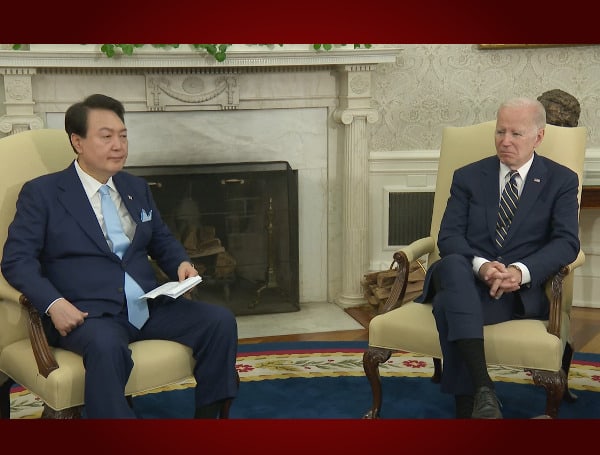
The presidents of the United States and South Korea have reaffirmed their alliance, agreeing that nuclear-armed submarines would resume port visits and threatening a “swift, overwhelming, and decisive response” to any North Korean nuclear attack, including retaliation in kind by the U.S.
The South Korean president, Yoon Suk-yeol, said the response would include U.S. nuclear weapons, clarifying the solid alliance between the countries and a means of force that normally isn’t mentioned.
Yoon and Joe Biden issued a joint declaration marking the 70th anniversary of the alliance during a visit by the South Korean leader to Washington on Wednesday.
In the news: VIDEO: Eco-Activists Storm Biden Climate Czar’s Speech Demanding ‘No More Drilling’
“A North Korean nuclear attack against the U.S. or its partners is unacceptable and would result in the end of whatever regime took the action,” Biden said. “I have absolute authority, and sole authority, to launch a nuclear weapon, but what the declaration means is that we will consult with our allies, if any action is so called for.”
The visit and the declaration have come at a time of increasing nervousness in South Korea about North Korea’s nuclear buildup, and calls for Seoul to develop its own nuclear arsenal. The Biden administration is seeking to reassure the South Koreans of US commitment.
In the declaration, Biden said that commitment was “ironclad” and that any North Korean nuclear attack on South Korea would be “met with a swift, overwhelming, and decisive response.”
The US extended deterrence, it said, was “backed by the full range of US capabilities, including nuclear.”
North Korea is a nuclear-armed state that has conducted six nuclear tests since 2006. The country is estimated to have between 30 and 40 nuclear weapons, and it is continuing to develop its nuclear and missile programs.
In the news: Video: 77-Year-Old Florida Man Alive Due To Actions Of Police In Armed Confrontation
North Korea’s nuclear program is a major threat to regional and global security. The country’s nuclear weapons could be used to attack its neighbors, including South Korea and Japan, or to blackmail the United States and other countries.
The United States and its allies have imposed a number of sanctions on North Korea in an effort to pressure the country to give up its nuclear weapons program. However, these sanctions have so far been unsuccessful.
The future of North Korea’s nuclear program is uncertain. The country is facing a number of challenges, including economic sanctions, food shortages, and political instability. It is possible that North Korea could eventually give up its nuclear weapons program in exchange for economic assistance and security guarantees.
However, it is also possible that the country will continue to develop its nuclear weapons program, posing a major threat to regional and global security.
Android Users, Click To Download The Free Press App And Never Miss A Story. Follow Us On Facebook and Twitter. Signup for our free newsletter.
We can’t do this without your help; visit our GiveSendGo page and donate any dollar amount; every penny helps.
